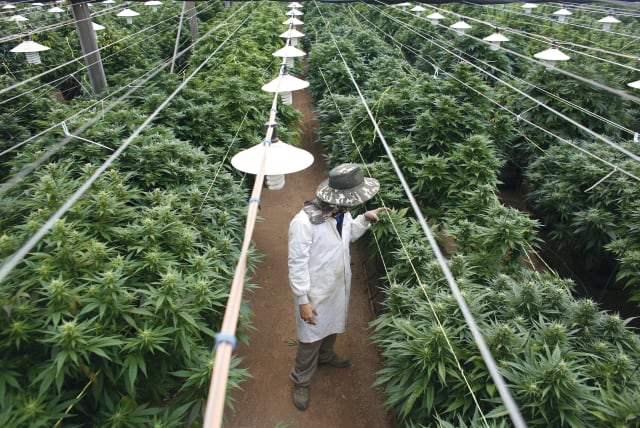Israel police seizes 137,000 cannabis plants in largest op ever

Police raided 160 greenhouses containing 126,350 cannabis plants in the Negev firing range and additional nine greenhouses containing 11,200 plants were raided in the western Negev.
Israel Police officers raided 169 greenhouses in the western Negev and the IDF's firing range in the south in a complex operation that lasted three days, according to Israeli media.
This is reportedly one of the largest cannabis seizures ever made in Israel, with 137,550 plants seized by police.
The operation in the firing range was led by soldiers of the Southern Wing of the Internal Security Division of the Border Police, along with IDF reserve personnel and Green Patrol inspectors.
Police raided 160 greenhouses containing 126,350 cannabis plants in the Negev firing range and additional nine greenhouses containing 11,200 plants were raided in the western Negev.
In the days leading up to the operation, police conducted aerial reconnaissance missions which located the various greenhouses and allowed police to create an action plan to destroy them.
According to the police, the weight of the cannabis seized in the various greenhouses reached many tons, and its market value would reach hundreds of millions of shekels.
"This is a serious blow to criminals who could pocket large sums of money to continue financing their criminal activities," the police said.
Police also found a large amount of the equipment used in the greenhouses, which Police believe had been stolen from Negev farmers, this includes growing equipment and fertilization equipment.
Cannabis reform
This comes weeks after the Health Ministry announced that medical cannabis would receive a "comprehensive reform", with the aim being to reduce regulation and transfer more responsibility to cannabis farmers.
Germany recently approved a bill that paves the way for recreational cannabis consumption, the bill was specifically approved to curb the black market and drug trade to protect children and young people from their unregulated access.
The proponent of the German bill described the bill as a reaction to the failure of previous drug policies to prevent cannabis from becoming adulterated with toxic substances.
Jerusalem Post Store
`; document.getElementById("linkPremium").innerHTML = cont; var divWithLink = document.getElementById("premium-link"); if (divWithLink !== null && divWithLink !== 'undefined') { divWithLink.style.border = "solid 1px #cb0f3e"; divWithLink.style.textAlign = "center"; divWithLink.style.marginBottom = "15px"; divWithLink.style.marginTop = "15px"; divWithLink.style.width = "100%"; divWithLink.style.backgroundColor = "#122952"; divWithLink.style.color = "#ffffff"; divWithLink.style.lineHeight = "1.5"; } } (function (v, i) { });

